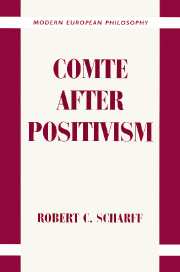Book contents
- Frontmatter
- Contents
- Preface
- Acknowledgments
- Note on Citations
- COMTE AFTER POSITIVISM
- Introduction: Comte for a Post-Positivist World
- Part I Comte Then
- Part II Comte Now
- 4 Comte's Ambiguous Legacy: Science Defended or Already Justified?
- 5 Cartesian Ahistoricism and Later Epistemic Analysis
- 6 Comte and the Very Idea of Post-Positivist Philosophy
- 7 Comte for Tomorrow?
- Bibliography
- Index
6 - Comte and the Very Idea of Post-Positivist Philosophy
Published online by Cambridge University Press: 06 July 2010
- Frontmatter
- Contents
- Preface
- Acknowledgments
- Note on Citations
- COMTE AFTER POSITIVISM
- Introduction: Comte for a Post-Positivist World
- Part I Comte Then
- Part II Comte Now
- 4 Comte's Ambiguous Legacy: Science Defended or Already Justified?
- 5 Cartesian Ahistoricism and Later Epistemic Analysis
- 6 Comte and the Very Idea of Post-Positivist Philosophy
- 7 Comte for Tomorrow?
- Bibliography
- Index
Summary
The Comte I have been trying to present in these pages has a Janus face. In his dominant and better-known mood, he speaks about the positive method and the religion of humanity as if from the same sort of ahistorically self-possessed viewpoint that his successors do about their more narrowly defined, more exclusively and formally epistemic projects. Yet operating silently throughout his works, inaccessible to him and largely unrecognized thereafter, there is Comte's other historico-critical impulse – one that constitutes a direct challenge in principle to the very attitude of self-possession and imperiousness he otherwise so often displays in practice. My purpose has not been to hold this double-sidedness against Comte, nor do I now wish to conclude by choosing a side. Instead, I am interested in showing that there is contemporary profit to be had in recognizing the ambiguity of Comte's position – or, more precisely, in understanding that ambiguity insofar as it essentially involves the continual sabotaging of a (still promising) historico-critical impulse by a dominant (originally Cartesian) ahistoricism. For this sort of ambiguity, in just this configuration, also appears to haunt the work of some of our own post-positivists. Like Comte, they also frequently start out by attempting to, in Putnam's words, “step back to diagnose our situation” and then repeatedly revert to speaking as if from nowhere.
Adequate discussion of all the ways this ambiguity shows itself in the contemporary situation is obviously out of the question here.
- Type
- Chapter
- Information
- Comte after Positivism , pp. 143 - 175Publisher: Cambridge University PressPrint publication year: 1995

